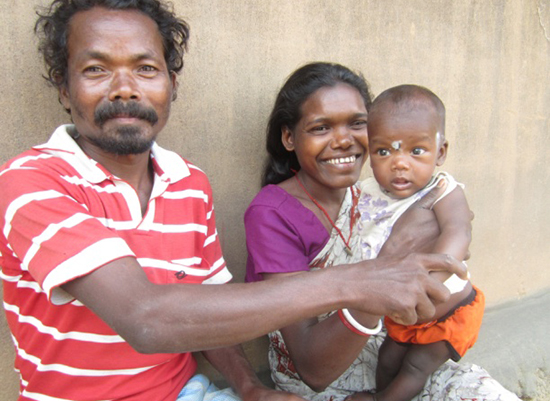Authored by our colleagues Concern Worldwide
 Late in the term of her fourth pregnancy, Sini was anemic and felt very weak. Around this time, the villagers chose Mangal as a Male Health Activist for Sini’s village in India’s Keonjhar District, Odisha under the program sponsored by Concern Worldwide’s Innovations for Maternal, Newborn & Child Health and our in-country partners, Women’s Organization for Socio-Cultural Awareness. In light of Sini’s condition, Mangal counseled Sini’s husband, Kata, about the importance of having the baby in a health facility attended by a skilled birth attendant, but Kata vehemently refused. As is often the case in Keonjhar, men decide about household finances and spending on health care. This means that even if women want to seek care during pregnancy and childbirth, or for their newborn, their husbands can decide against it. The Male Health Activists are a cadre of rural health workers and health advocates who talk directly to husbands and fathers to help involve men in making positive decisions about the health care for mothers and newborns.
Late in the term of her fourth pregnancy, Sini was anemic and felt very weak. Around this time, the villagers chose Mangal as a Male Health Activist for Sini’s village in India’s Keonjhar District, Odisha under the program sponsored by Concern Worldwide’s Innovations for Maternal, Newborn & Child Health and our in-country partners, Women’s Organization for Socio-Cultural Awareness. In light of Sini’s condition, Mangal counseled Sini’s husband, Kata, about the importance of having the baby in a health facility attended by a skilled birth attendant, but Kata vehemently refused. As is often the case in Keonjhar, men decide about household finances and spending on health care. This means that even if women want to seek care during pregnancy and childbirth, or for their newborn, their husbands can decide against it. The Male Health Activists are a cadre of rural health workers and health advocates who talk directly to husbands and fathers to help involve men in making positive decisions about the health care for mothers and newborns.
When Sini went into labor, villagers informed the female community health worker, and Mangal, the Male Health Activist. While the female community health worker stayed with Sini, Mangal immediately arranged for a vehicle to transport Sini to the nearest health clinic, where the doctor promptly referred her to the district hospital. Upon arrival at the hospital, Sini was desperately in need of blood and Mangal arranged for blood to arrive from the nearest blood bank. The very next day, Sini gave birth to a healthy baby girl. Prior to her discharge, while Sini was at the hospital under the doctor’s care and observation, her husband, Kata, realized that the cause of death for their previous babies was due to improper care during pregnancy and delivery by unskilled birth attendants.
As Kata shared, “I am a lay man and never tried to understand the impact of neglecting the mother during pregnancy and delivery, for which we lost the babies. Mangal [the Male Health Activist] gave a ray of hope for me and now I have a happy family and a healthy child.”
Concern’s evaluation of the Male Health Activists program found that male community health workers contributed to reproductive, maternal, newborn and child health by:
- Promoting awareness of reproductive health and family planning among men;
- Facilitating access to skilled and facility-based delivery;
- Providing support to community health events;
- Improving knowledge among men about home-based care for pregnant women, lactating women and children under five.
With evidence that this pilot idea can improve knowledge and potentially promote access to care, Concern and our partner Women’s Organization for Socio-Cultural Awareness are identifying opportunities to maintain and expand the pilot to reach more villages and families. An ultimate goal for the project continues to be supporting its integration into the national plans for community health workers in India, to keep reaching men and involving them as fathers and husbands in care for the whole family.